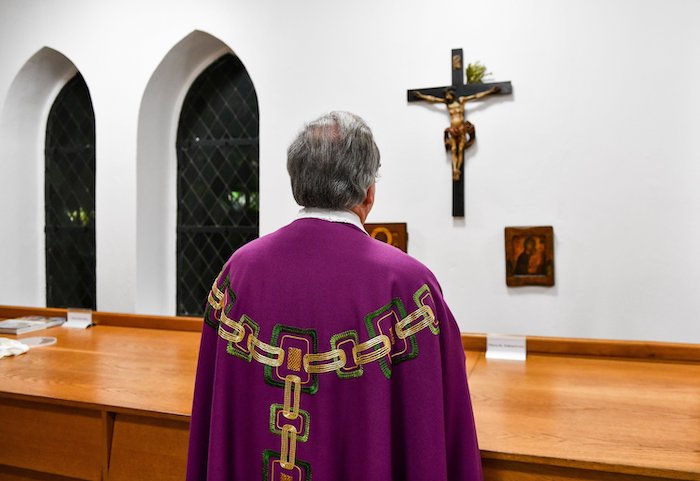By Junno Arocho Esteves
VATICAN CITY (CNS) — Priests must not shut themselves into small-knit cliques but instead open themselves to the world and make God’s love reach everyone, Pope Francis said.
“Please, let us not remain barricaded in the sacristy and cultivate small, closed groups where we can pamper ourselves and be comfortable,” the pope said Feb. 7 during an audience with priests studying at Rome’s Pontifical Lombard Seminary.

“There is a world waiting for the Gospel and the Lord wants his shepherds to be conformed to him, carrying in their hearts and on their shoulders the expectations and burdens of the flock. Open, compassionate and merciful hearts,” he said.
Established by the bishops of the northern Italian region of Lombard in 1854, the institution serves as the residence for diocesan priests — Italian and non-Italian — pursuing advanced degrees in Rome.
In his speech, the pope noted that the day marked the anniversary of the election of Pope Pius XI who was “one of the first alumni” of the pontifical seminary.
“From these roots linked to Pius XI, we may try to draw some inspiration, not to cultivate nostalgia for the past and close ourselves to the newness of the Spirit, who invites us to live today, but to trace some prophetic signs for your ministry and your mission, particularly in the service of the church and the Italian people,” he said.
The pope recalled that upon his election, Pius XI chose to deliver his first blessing from the balcony of St. Peter’s rather than from inside the basilica. His example, he said, serves as a reminder for priests “to open up and to expand the horizon of the ministry to the dimensions of the world.”
Pope Francis said he knew that some of the priests, who go to confession at Rome’s Basilica of St. Mary Major, located near the seminary, tell each other afterward, “Go to that one, but not that one — he’ll make your life miserable.”
Just as the student priest seek to confess with “priests who are merciful to us,” they must also strive to show mercy to those who come to them.
“Just as we want mercy when we go to ask forgiveness for our sins and seek the most merciful, you must be merciful with everyone,” he said. “Don’t forget that God never tires of forgiving. We are the ones who tire of asking for forgiveness, but he never gets tired of forgiving.”
The pope reminded the priests of Pius XI’s first homily as pope, in which the newly elected pontiff invited Christians to ask themselves, “What can I offer the Lord?”
That question, he added, “does not revolve around you, your desire for that cathedra, that parish, that position in the curia” but instead is an invitation to open their hearts to “availability and service.”
“Often, even here in Italy, ecclesial discourse is reduced to sterile internal dialectics between those who are innovators and those who are conservatives, between those who prefer one politician and those who prefer another, and we forget the central point: to be church in order to live and spread the Gospel,” the pope said.
Finally, Pope Francis recalled his predecessor’s words in the 1931 encyclical “Quadragismo Anno” (“In the 40th year”) on the reconstruction of the social order, and particularly Pius XI’s warning of “an immense power and despotic economic dictatorship (that) is consolidated in the hands of a few.”
The pope encouraged priests to follow Pope Pius’ example and to not only “be attentive to the signs of suffering of the people” but also to “be competent and courageous in raising prophetic words in the name of the voiceless.”
“Great tasks await you,” he said. “The church is beautiful! Dream of the Italian church of tomorrow that is more faithful to the spirit of the Gospel, more free, more fraternal and joyful in bearing witness to Jesus, animated by the ardor to reach out to those who have not known the ‘God of all consolation.'”
